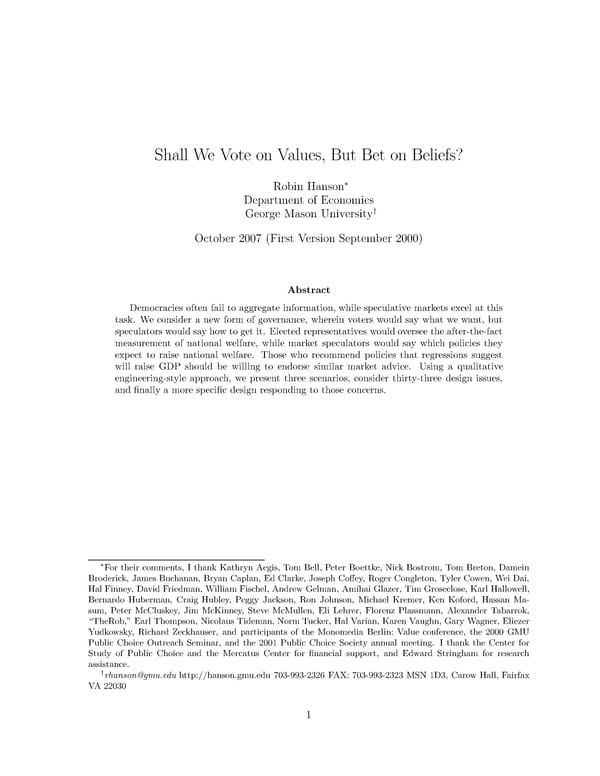Shall We Vote on Values, But Bet on Beliefs? ∗ Robin Hanson Department of Economics George Mason University† October 2007 (First Version September 2000) Abstract Democracies often fail to aggregate information, while speculative markets excel at this task. We consider a new form of governance, wherein voters would say what we want, but speculators would say how to get it. Elected representatives would oversee the after-the-fact measurement of national welfare, while market speculators would say which policies they expect to raise national welfare. Those who recommend policies that regressions suggest will raise GDP should be willing to endorse similar market advice. Using a qualitative engineering-style approach, we present three scenarios, consider thirty-three design issues, and finally a more specific design responding to those concerns. ∗For their comments, I thank Kathryn Aegis, Tom Bell, Peter Boettke, Nick Bostrom, Tom Breton, Damein Broderick, James Buchanan, Bryan Caplan, Ed Clarke, Joseph Coffey, Roger Congleton, Tyler Cowen, Wei Dai, Hal Finney, David Friedman, William Fischel, Andrew Gelman, Amihai Glazer, Tim Groseclose, Karl Hallowell, Bernardo Huberman, Craig Hubley, Peggy Jackson, Ron Johnson, Michael Kremer, Ken Koford, Hassan Ma- sum, Peter McCluskey, Jim McKinney, Steve McMullen, Eli Lehrer, Florenz Plassmann, Alexander Tabarrok, “TheRob,” Earl Thompson, Nicolaus Tideman, Norm Tucker, Hal Varian, Karen Vaughn, Gary Wagner, Eliezer Yudkowsky, Richard Zeckhauser, and participants of the Monomedia Berlin: Value conference, the 2000 GMU Public Choice Outreach Seminar, and the 2001 Public Choice Society annual meeting. I thank the Center for Study of Public Choice and the Mercatus Center for financial support, and Edward Stringham for research assistance. †rhanson@gmu.edu http://hanson.gmu.edu 703-993-2326 FAX: 703-993-2323 MSN 1D3, Carow Hall, Fairfax VA22030 1
 Shall We Vote on Values, But Bet on Beliefs? Page 1 Page 3
Shall We Vote on Values, But Bet on Beliefs? Page 1 Page 3